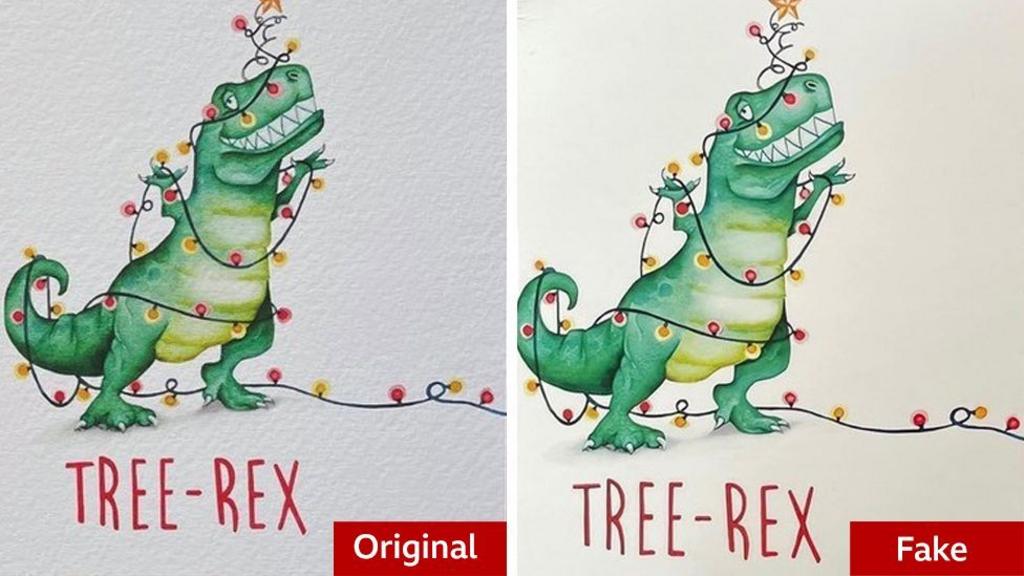E-commerce platform Temu has reached an agreement with the greeting card industry to expedite the removal of designs infringing on copyright from its website.
Greeting card companies report that unauthorized reproductions of hundreds of their copyrighted images have been offered for sale, resulting in significant financial losses.
Designers speaking with the BBC described the process of having plagiarized listings removed as a frustrating cycle, with copied products frequently reappearing shortly after takedown.
Temu has stated that safeguarding intellectual property is a “top priority” and is encouraging vendors to participate in a trial program streamlining the takedown process specifically for the greeting card industry.
Amanda Mountain, co-founder of Lola Design based in York, discovered that almost her entire design catalog, accumulated over a decade, had been replicated.
She found that images she had created were being used without permission by other sellers on cards and various other merchandise, such as t-shirts.
After ordering a card featuring her design, Amanda found the image quality to be poor and the paper inferior compared to her own products.
“It’s disheartening to see something you’ve invested so much passion and time in taken within minutes,” she told the BBC. “I was shocked and questioned the point of continuing to design at all.”
Amanda and her husband, Frank, who is also her business partner, estimate that unauthorized versions of their products have generated £100,000 in sales for online vendors, representing roughly 13% of Lola Design’s annual revenue.
Amanda emphasized that the emotional toll and the time required to remove infringing products have had the most significant impact.
“Every design I create is deeply personal,” she said. “It might sound strange, but it’s true. Designers invest a part of themselves in their work, aiming to create a little joy, and it’s not unreasonable to expect that to be respected.”
Following advocacy from the Greeting Card Association (GCA), Temu has introduced a specialized takedown procedure for the industry, intended to facilitate quicker removal of stolen designs and prevent their re-upload.
Previously, card companies had to report each infringing listing individually; however, the trial program allows them to submit a single link, after which the system will remove the product and any others using the same design.
One card publisher involved in developing the new system reported that 68 listings were removed automatically, a process that previously would have required submitting 68 separate forms or emails to Temu.
According to the GCA, the system will utilize AI to register the designer’s original creation as a protected image, preventing any products using that design from being listed for sale.
In a statement, Temu asserted that “intellectual property protection is a top priority” and that the company has “invested heavily in resources to strengthen trust with brands, sellers and consumers.”
The company stated that most requests to remove copyrighted content are resolved within three business days and that greeting card companies are encouraged to participate in the new trial, which it anticipates will lead to more automated product removals.
While the system is tailored to the card industry, the BBC understands that it could serve as a template for similar processes for other product categories.
Amanda Fergusson, chief executive of the GCA, stated that the industry welcomes the changes. “Our members are deeply concerned about copycat sellers, and customers are often disappointed with cheap imitations,” she said.
“Our discussions with Temu and their subsequent actions are a positive initial step toward resolving these issues,” she added.
For Amanda and Frank, the stakes extend beyond their own livelihoods to the future of the entire supply chain that relies on the £1.5 billion greeting card market in the UK each year.
“Ultimately, consumers will be affected, not just designers, because high streets will suffer,” Amanda said. She also cautioned consumers about purchasing counterfeit cards: “Cheap always comes at a cost.”
Staff at a Newcastle barbers thank people for their support and say they hope to find a new venue.
The Whitchurch Marketing Collaborative was set up after shops in the market town noticed a decline in footfall.
Terence Chung and his friend have used a £10,000 loan to recycle broken or waste flip-flops.
Shoppers say they will be deterred from coming into Bedford if the concession is suspended.
A diverse range of 28 businesses have been awarded grants from the Surrey Economic Growth Fund.

